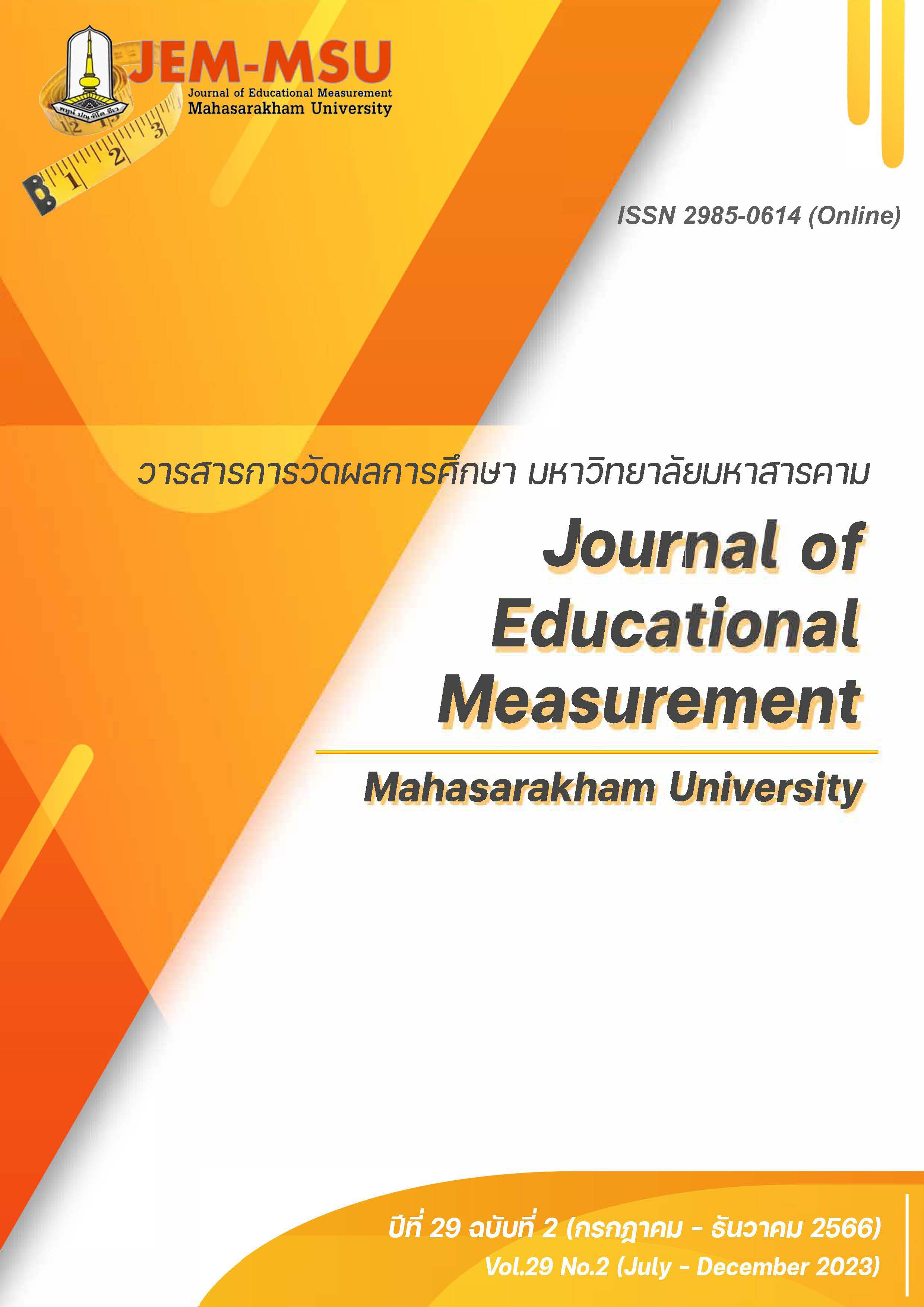Factor Analysis of Writing Ability of Upper Secondary School Students under Chiang Mai Secondary Education Service Area Office
Main Article Content
Abstract
The purpose of this research was to analyze the factors of writing ability of upper secondary school students under Chiang Mai Secondary Education Service Area Office. The sample consisted of 860 upper secondary school students form 5 schools under Chiang Mai Secondary Education Service Area Office, obtained through Multi-Stage Random Sampling. The research tool used to collect the data was a writing ability test, which was a subjective test. Scoring followed the writing ability assessment criteria in all of the 5 components. The data analysis employed descriptive statistics analysis, Pearson’s Correlation Coefficient and a Confirmatory Factor Analysis using Mplus 7.4 Program.
The results of the research revealed that the writing ability of the upper secondary school students under Chiang Mai Secondary Education Service Area Office consisted of 5 components: (1) content presentation, (2) story composition, (3) vocabulary usage, (4) language usage, and (5) language mechanism. Also, the results of the consistency examination of the model for measuring the writing ability of the upper secondary school students showed that the model was consistent with the empirical data when the Chi-square value () = 66.046 at degree of freedom (df) = 61, Significance level = 0.307, Comparative fit index (CFI) = 0.984, Tucker-Lewis Index (TLI) = 0.980, Root Mean Square Error of Approximation (RMSEA) = 0.010, Standardized Root Mean Square Residual (SRMR) = 0.025. The factor with the highest factor loading was the content presentation (0.828, R2=0.686), followed by the language usage (0.569, R2=0.324), the language mechanism (0.555, R2=0.308), the story composition (0.519, R2=0.269) and the vocabulary usage (0.248, R2=0.062), respectively.
Article Details

This work is licensed under a Creative Commons Attribution-NonCommercial-NoDerivatives 4.0 International License.
The content and information contained in the published article in the Journal of Educational Measurement Mahasarakham University represent the opinions and responsibilities of the authors directly. The editorial board of the journal is not necessarily in agreement with or responsible for any of the content.
The articles, data, content, images, etc. that have been published in the Journal of Educational Measurement Mahasarakham University are copyrighted by the journal. If any individual or organization wishes to reproduce or perform any actions involving the entirety or any part of the content, they must obtain written permission from the Journal of Educational Measurement Mahasarakham University.
References
Ampa, A., & Quraisy, H. (2018). Needs Analysis of the English Writing Skill as the Base to Design the Learning Materials. SHS Web of Conferences. 42. 00050.
Byrne, D. (1988). Teaching Writing Skills New Edition. Longman.
Fisher, R. A. (1954). Statistical Methods for Research Workers (12th ed). Hafner.
Hosseini, H., Chalak, A., & Biria, R. (2019). Impact of Backward Design on Improving Iranian Advanced Learners’ Writing Ability: Teachers’ Practices and Beliefs. International Journal of Instruction, 12(2), 34.
Jacobs, H. J., Zingraf, S. A., Wormuth, D. R., Hartfiel, V. F., & Hughey, J. B. (1981). Testing ESL composition: A practical approach. Newbury House.
Khatib, M., & Meihami, H. (2015). Languaging and writing skill: The effect of collaborative writing on EFL students’ writing performance. Advances in Language and Literary Studies, 6(1), 203-211.
Khoshsima, H. (2016). The Effect of Virtual Language Learning Method on Writing Ability of Iranian Intermediate EFL Learners. Advances in Language and Literary Studies, 7(2), 192.
Lieber, R. (2009). Introduction Morphology. Cambridge University Press.
Lunenburg, F.C., & Lunenburg, M.R. (2014). Applying Multiple Intelligences in the Classroom: A Fresh Look at Teaching Writing. International journal of scholarly academic intellectual diversity, 16(1).
Mercer, C.D., & Pullen, P.C. (2005). Students with learning disabilities. Pearson Prentice Hall.
Patel, M.F., & Jain, P.M. (2008). English Language Teaching: Methods, Tools, and Technique. Sunrise Publisher and Distributors.
Paulston, C.B., & Bruder, M.N. (1976). Teaching English as a Second Language: Technique and Processes. Wintrop.
Pek, L.S., Mee, R.W.M., Shing, S.R., Theesmas, D., & Nadarajan, N.-T.M. (2019). Strengthening Tertiary Students Writing Skills Through T.R.E.N.D. Model. Asian Journal of Contemporary Education, 3(1), 65–71. https://doi.org/10.18488/journal.137.2019.31.65.71
Aksaranugraha, S. (1989). Teaching language and cultural skills. Department of Secondary Education, Faculty of Education, Chulalongkorn University. (in Thai)
Chinnawongs, S. (2000). Language competence and writing ability. Journal of Chula Research, 7, 9-11. (in Thai)
Damrongpanit, S. (2020). Mplus program with behavioral science research data analysis and social science. Chulalongkorn University Press. (in Thai)
Intachai, S. (2016). The development of paragraph writing ability of first-year students at Nakhon Ratchasima Rajabhat University via video-assisted instruction [Research report]. Nakhon Ratchasima Rajabhat University. (in Thai)
Laksanasiri, C., & Imsamran, B. (2005). Language and Community. P. Press. (in Thai)
Office of the Basic Education Commission. (2008). Indicators and core content Group learning Thai according to The Basic Education Core Curriculum B.E. 2551. Printing Agriculture Cooperatives of Thailand. (in Thai)
Piyapimonsit, C. (2005). Using SPSS for Data Analysis (Revised edition No.5). Faculty of Education, Thaksin University. (in Thai)
Puapan, S. (1989). A Level of English Writing Ability of Students at The Upper Secondary Education Level [Master’s thesis]. Chulalongkorn University. (in Thai)
Rueangkitchanan, A. (2016). Development of an Instructional Model by Integrating Cognitive Apprenticeship Approach and Process Writing Approach for Enhancing Expository Writing Ability and Reflective Thinking Ability of Undergraduate Students [Doctoral dissertation]. Chulalongkorn University. (in Thai)
Sarajun, N. (2017). Developing The Narrative Writing Abilities of Matthayomsuksa 4 Students Using Hewins’ Writing Process [Master’s thesis]. Mahasarakham University. (in Thai)
Satjapiboon, S. (2010). Development of an Instructional model by Integrating Process-based, Content-based and Genre-based Approach for Enhancing Academic Writing and Critical Thinking Ability of Undergraduate Students [Doctoral dissertation]. Chulalongkorn University. (in Thai)
Somnam, S. (2016). Organizing activities to develop Thai language skills. Thanapon printing. (in Thai)
Suwannapracha, K. (2013). Using Group Investigation Based on Local Content to Promote Knowledge, English Writing Ability and Group Working Skills Among Mathayom Suksa 4 Students [Master’s thesis]. Chiang Mai University. (in Thai)
Wasi, P. (1999). Importance of Writing. In Writing for Life: Techniques for Successful Writing. 9-17. Thai Center for Development Foundation. (in Thai)


